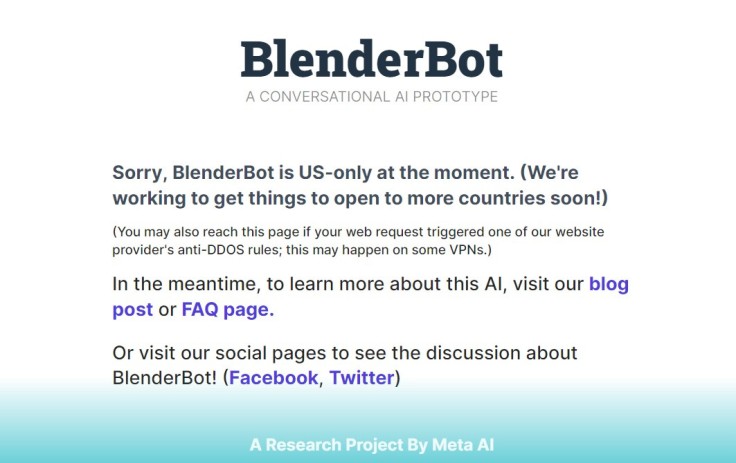
The public can interact with Meta's brand-new AI chatbot to provide input on its features.
Meta's BlenderBot 3 AI-Powered Chatbot
The artificial intelligence-powered bot, known as BlenderBot 3, is intended to enhance its safety and conversational abilities by conversing with individuals. On Friday, Meta publicly launched the chatbot as part of an AI research project, according to the news story by CNET.
On this public website, U.S. residents can have conversations with Meta's new chatbot on almost any subject.
Unfortunately, this prompt will be displayed to people who are outside of the U.S.:

The AI generates its messages using recollections of past chats and internet searches. The chatbot's ability to conduct internet searches to discuss particular topics is a key feature, according to The Verge report.
You Can Give Your Feedback to Meta's New Chatbot
Meta hopes to get feedback on the different issues large language models face by making the chatbot available to a broader audience. In order to increase the number of topics BlenderBot can discuss, CNET noted that the social media giant gathered publicly available data from more than 20,000 discussions between humans and bots.
By clicking the "thumbs down" symbol next to an offensive message and choosing "Rude or Inappropriate" as the reason for disliking it, users who interact with the chatbot can express their opinion about it. The message was off-topic, senseless, or spam-like, among other alternatives, available when people submitted comments.
As per CNET, giving the chatbot any personal information, including names, addresses, and birthdays, is discouraged. Users can opt-out of keeping their data at the end of the session if they don't want their conversations with the bot to be recorded and used for research or inadvertently disclose personal information while chatting. The conversational data will subsequently be permanently deleted, according to Meta.
Safety Concerns on Chatbots
The research being done by Meta as part of her research is a part of larger initiatives to enhance AI, a discipline that struggles with issues like bias, privacy, and safety.
The demo for Meta could be risky because previous chatbot experiments have failed. After it started tweeting offensive and racial statements in 2016, Microsoft shut down its Tay chatbot.
Chatbot's Predecessors
According to Meta, the third iteration of BlenderBot now has features like internet search, long-term memory, personality, and empathy.
The prototype bot is based on Meta's prior work with large language models (LLMS), which are capable but inconsistent text-generation software. Like other LLMs, BlenderBot undergoes extensive training on massive text datasets, which it then mines for statistical patterns to produce language, according to The Verge.
Such systems have shown to be incredibly adaptable and have been used for a variety of tasks, including helping writers create their next best-selling book and creating code for programmers.
However, these models also have critical flaws: they frequently create responses to user questions and reproduce biases in their training data.
Related Article : Microsoft Censored Its Own Chinese AI Chatbot So It Could Roll On China









